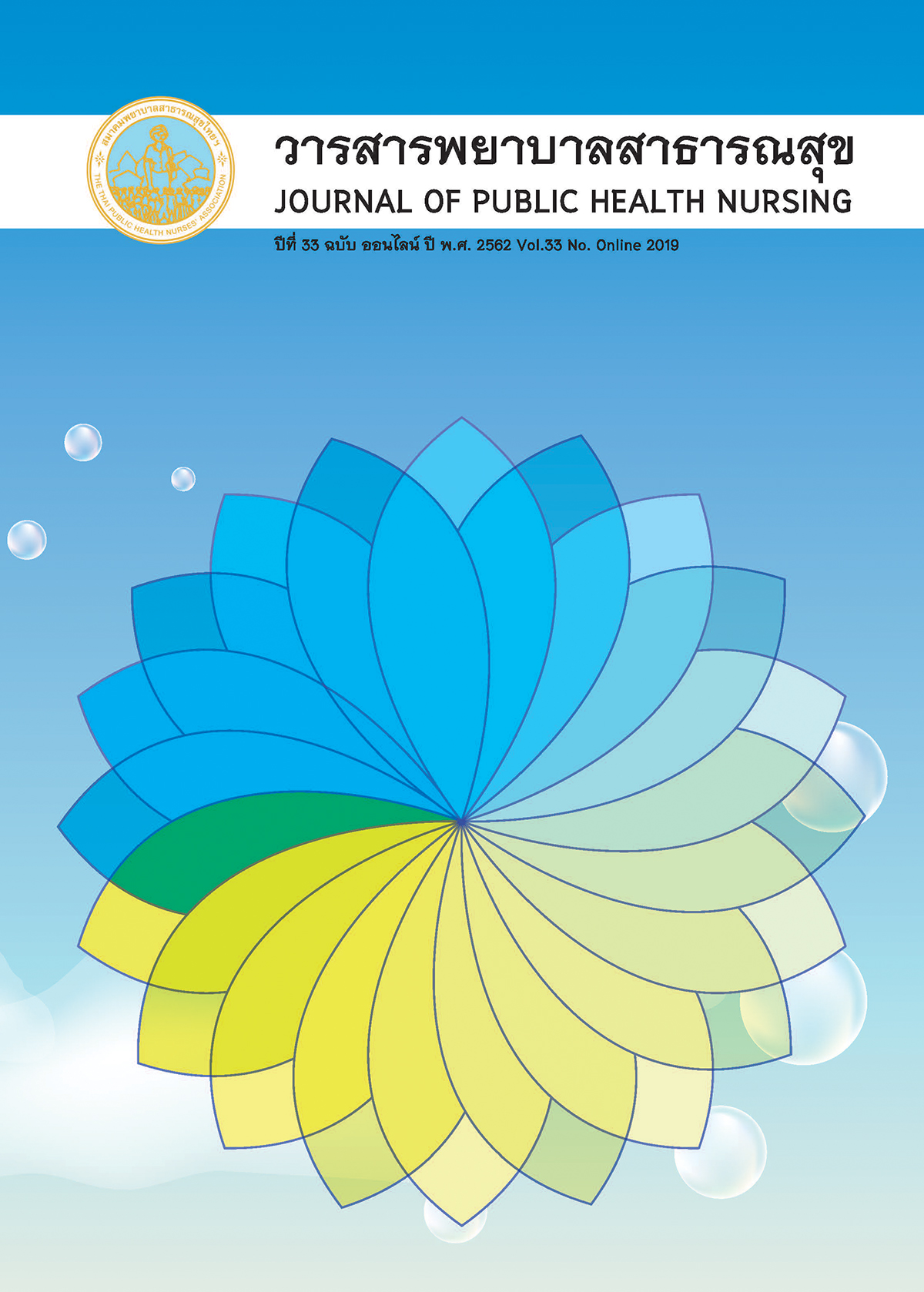The Development of Enhanced Exercise Programs Using a Transtheoretical model for Behavioral Change among Elderly Teachers and Education staff.
Keywords:
Process of change, Behavioral change, Elderly Teachers, Education staff, Transtheoretical model, Enhanced exercise ProgramsAbstract
Exercise is another way to encourage the elderly to increase daily activities, decrease dependency, and improve self-esteem. It was reported that the elderly teachers and education staff in Bangkok area were still having inappropriate exercise because the exercise programs provided were unable to change the behavior. The aimed of this study was to develop exercise enhancement programs using the transtheoretical model for behavioral change. Research design divided into Three phases. In Phase I, the exercise promotion activities were drafted and studied the readiness of behavioral exercise changes among 165 participants. In Phase II, Development prototype program by using drafted in Phase I. The samples consisted of seventeen small groups of fifty-nine people with four modules. In Phase III, studied the effectiveness of enhanced exercise programs with eighty nine samples. The percentage and t-test statistics were used to analyze the data.
The results showed that after participating in activities at a statistical level of .05; (1) all of the samples had higher level of stage of changed the exercises than pre-intervention; (2) decisional balance: they had perceived the benefits of exercise (pros) higher and perceived losses (cons) lower than pre-intervention; (3) self-efficacy; they had higher confidence and lower perceived temptation; and (4) the samples had processed to behavior change better. Therefore, the guidelines for creating exercise programs need to promote the readiness in each phase of behavior change, decisional balance, self-efficacy and continuous encouragement which will enhance the exercise program effectively.
References
2. National Statistical Office Ministry of Information and Communication Technology. The 2014 Survey of the older persons in Thailand ;2018 .p. 3.
3. Ratri R. Exercise help older person improve quality life. Academic Conference conclusion National Health and environment 8 of 2015: Department of Health Ministry of Public Health; 2015.p.21-22.
4. Department of Older Persons. The older plan (2002 – 2021). Bangkok: Thepimwanich;2010.p.29-30.
5. Puangthong Kraipibool. Journal of Older Person, http://haamor.com/th/#articel06 2014.
6. Office of the welfare promotion commission for teachers and educational personnel. Model of health-enhancing teachers and educational personnel.Bankok: Trade Organization; 2014.p.35-36.
7. Strategy and Planning Division Ministry of Public Health, Ministry of Public Health Strategic plan 2017. Ministry of Public Health. (In Thai)
8. Office of the welfare promotion commission for teachers and educational personnel. Model of health-enhancing teachers and educational personnel.Bankok: Trade Organization; 2014.p.35-36.
9. Prochaska, J. O., Velicer, W. F., DiClemente, C. C., & Fava, J. Measuring processes of change: Applications to the cessation of smoking. Journal of Consulting and Clinical Psychology. 1988; 56(4): 520-528.
10. Prochaska, J., Redding, C., & Evers, K. The Transtheoretical Model and Stages of Change. In t. ed (Ed.), Health Behavior and Health Education. San Francisco: Jossey-Bass;2008
11. SOMNUK K, TIPAYANATE A. DEVELOPMENT OF CENTER FOR EXERCISE PROMOTION IN ELDERLY PERSONS. BANGKOK: FACULTY OF ALLIED HEALTH SCIENCES CHULALONGKORN UNIVERSITY; 2009
12. Marcia, G. O., Shinduk, L., Gang, H., Samuel, D., Towne, J., Cindy, Q., Matthew, L. S. Effectiveness of a Lifestyle Intervention on Social;2018
13. Seddigheh, A., Rabiollah, F., Fateme, N., Arezoo, M., & Ghiasvand, L. Decisional balance and self-efficacy of physical activity among the elderly in Rasht in 2013 based on the transtheoretical model Electronic physician.2017; 9(15), 4447-4453.
14. Saied Saeed, M. M., Maryam, M., & Mohammad, A. M. S. A. Application of Transtheoretical Model to Exercise in Office Staff. Electronic physician.2013; 5(1), 588-593.
15. Barbara, R., Denise, O., Jay, M., & Carol, W. The Effect of SocialSupport on Exercise Behavior in Older Adults. CLINICAL NURSING RESEARCH.2016; 11(1), 52-70.
16. Abdurrahman, C., Mahboubeh, D., Kamal, M., Bagher, P., Elias, B., Hajar, D., Rahimi6, A. Decisional Balance and Its Relationship with Stages of Change in Exercise;2017.
17. Velicer, W. F., Prochaska, J. O., Fava, J. L., Norman, G. J., & Redding, C. A. Smoking cessation and stress management: Applications of the transtheoretical model of behavior change. Homeostasis in Health and Disease.1988;38(5-6) :216- 233.
18. Chun, Y., Ja.Kim, S. I., Lee, P. S., Kim, S. Y., Lee, S. J., Park, E. S., & Chang, S. O. Process of Change Corresponding to the Stage of Change of Exercise in Elderly. Journal of Korean Academy of Nursing. 2000; 32(2): 354.
19. Bandura, A. . The exercise of control. In W. H. Freeman. (Ed.), Self-efficacy New York.1997.
20. Yupa J. Strengthening Self-efficacy of the Elderly with Hypertension for Exercise. Bangkok:Roles of Family Members;2012.
21. Nittaya S. An Exercise Promotion Program Applying the Transtheoretical Model in Nursing Students at Kuakarun College of Nursing. Department of Medicine. Bangkok: Bangkok Metropolitan Administration;2011.
Downloads
Published
How to Cite
Issue
Section
License
บทความที่ตีพิมพ์และแผนภูมิรูปภาพถือเป็นลิขสิทธิ์ของวารสารพยาบาลสาธารณสุข (Thai Public Health Nurses Association)







